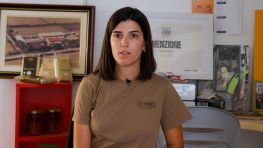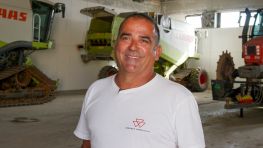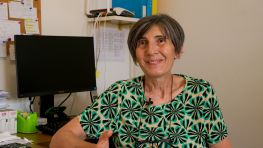 Rosalia Vacca and the Dream of…
Rosalia Vacca and the Dream of… Roberto Marinone
Cascina Bosco Fornasara
Son and grandson of rice farmers, Roberto has converted a portion of 50 hectares of land to organic, separating it from the family farm. His path has shown the skeptics that it is possible to produce truly organic rice and achieve good profitability. However, it is necessary to undergo a fundamental change of technology and mentality and to adopt an agro-ecological approach.
In the interview, Roberto explains the methodology used, the actions taken to support the environment, the future projects, the difficulties and challenges but also the wonder of the biodiversity that is returning. Farmers should play a key role in protecting the environment and biodiversity as well as in mitigating climate change. But in Lomellina, where industrial rice farming has greatly simplified the landscape, there is still not much will to change. However, an agro-ecological approach to rice cultivation would also be possible on a large scale.
Video table of contents
- The simplification of the landscape in Lomellina
- The conversion of our farm: beyond organic agriculture
- It has always been thought that organic rice could not be made but skepticism decreases
- Unfortunately in our territory we see little change
- Water management in our rice fields and its impact on biodiversity
- Wild plant and animal species that accompany our work
- The cleaning of canals
- The role of farmers in protecting the environment and mitigating climate change
- we live climate change but bringing back organic substance in the soils we are more resilient in periods of drought
- The qualities that must have a rice grower who practices an agro-ecological approach
- My future rice paddy is an agricultural oasis
- Green mulching and grooming. Each company must then "sew on" these methods adapting them to their field and area
- Quails and mushrooms return also to the fields
- The difficulties and challenges of this type of agriculture are numerous
- The role of consumers and agricultural policies
- On wheat and rice evolutionary populations
- An emblematic word for rice fields: "water"
Interview information
Country: IT
Region: Lombardia
City: Pavia
Suburb: Nicorvo
Locality: Cascina Bosco Fornasara
Urls: Cascina Bosco Fornasara
Roberto Marinone
Date of birth: 11-30-1980
Profession: Farmer
Languages: italiano
Document by: Annalisa D'Orsi
Video by: Annalisa D'Orsi, Luca Ghiardo
Created: 21-03-2024
Questo video fa parte del seguente archivio
Rice stories
Rice stories
Food is a fundamental resource for man and his health, both through the supply of nutrients and the ability to embody traits of human culture that play a leading role in our well-being.
Over time, each territory has built original ways in which to relate to the fruits of its land, enriching them with rituals, symbolic meanings and culinary customs. Much of these relationships have been lost following the years of the economic boom, with the exodus from the countryside to urban centers, with the advent of agriculture for mass production and ultimately with the globalization of markets and the consequent impoverishment of the heritage of biodiversity and ethnodiversity.
The purpose of this archive is to collect evidence relating to the main rice production area in Europe, that is the Po Valley, and to investigate, through the analysis of textual sources and testimonies collected in the field, both what survives of this heritage, and the ways in which which has evolved and reached us, paying particular attention to the explicit and implicit links that bind food and health.






